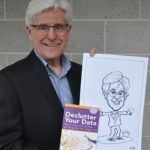 Social media obituaries are now common among the living. As we increasingly connect online, our friends, family, and colleagues communicate through social media and messaging apps. “Social media obituaries create a kind of techno-spiritual space where memories of the deceased can be publicly shared.” In our book, Digital Legacy Plan, Vicki McLeod and I examine how social media obituaries and similar online memorials are now one of the personal yet practical things we need to think about when a loved one dies.
Social media obituaries are now common among the living. As we increasingly connect online, our friends, family, and colleagues communicate through social media and messaging apps. “Social media obituaries create a kind of techno-spiritual space where memories of the deceased can be publicly shared.” In our book, Digital Legacy Plan, Vicki McLeod and I examine how social media obituaries and similar online memorials are now one of the personal yet practical things we need to think about when a loved one dies.
Social Media Obituaries: an excerpt from Digital Legacy Plan
Note: This excerpt has been edited for brevity.
Although [death notices and obituaries] were once commonly published in newspapers large and small, in the digital age, this practice has declined in popularity. The cost to place an obituary in most markets is high. It is far more common now to receive the news of a death via digital channels — email, Facebook, Twitter, an online news service, or via a link or announcement from a memorial site.
Who writes the obituary?
Past practice is that a friend or family member composed the obituary after the death of a loved one. A new trend is emerging where people are writing or recording their own obituaries or postmortem messages, obviously before they die, and posting them or leaving them in the care of their estate. These obituaries are often sassy, funny, and inspiring. It is also not uncommon in the online world for an especially well-written, touching, or witty obituary to “go viral.” Because information posted online is largely public, obituaries or memorial tributes are reposted and shared, sometimes by millions.
Whether you choose to prepare your own obituary or you have the task of writing one on behalf of a deceased friend or family member, there are a few key points to consider. For either a death notice or an obituary, do consult with family and friends as to content and tone. A death notice, by nature, is concise and factual, but an obituary is a more expanded personal account, and as a result often reflects the personality of the deceased. Consulting with friends and family will not only ensure an accurate and meaningful obituary, it will also help those grieving to process thoughts and feelings. It offers an opportunity for their memories and perspectives to be honored and expressed.
 Keep in mind that unofficial or unauthorized memorial posts may appear on one or more social media channels. These posts may be created by someone connected to the deceased with good intentions. Other times unexpected memorial posts might be triggered by peripheral mourners or people who hear about the death through news media.
Keep in mind that unofficial or unauthorized memorial posts may appear on one or more social media channels. These posts may be created by someone connected to the deceased with good intentions. Other times unexpected memorial posts might be triggered by peripheral mourners or people who hear about the death through news media.
How to write a death notice
Assuming you’re writing the official death notice or obituary, you may want to include the following information:
- The name (first and last) of the deceased (and nickname, if applicable).
- The year and location of birth and the date and location of death.
- Date, time, and location of the memorial or funeral service, viewing or visitation, and reception (if there is one).
- The name of a charity to which donations should be made in the deceased’s name in lieu of flowers.
- A short summary of surviving immediate family members (e.g., spouse, children, and grandchildren).
- A short thought about the deceased; for example, “He was well loved by his family and peers” or “Her accomplishments were widely recognized in her industry.”
How to write an obituary
The points above cover the details that should be in a death notice. For an obituary or a more expanded written tribute, consider
adding the following:
- A general indication of the nature of death (i.e., whether it was a sudden passing or after a long illness). For example, “after a courageous battle with cancer.”
- A list of survivors, starting with spouse, children, and grandchildren, followed by siblings and other immediate family members.
- A list of immediate family members that predeceased the deceased.
- Biographical details such as —
- education;
- career achievement;
- military, civic, or humanitarian service;
- hobbies, clubs, or other interests;
- special memories or descriptions of the deceased’s character or personality; and
- a favorite poem or quotation.
The cost of publishing an obituary
These points apply whether you are preparing the obituary for an online outlet or for more traditional media, such as newspapers. The difference, aside from medium, is in the cost. You will pay per column inch in most newspapers, although costs for obituary space vary. A digital or social media obituary is typically a costfree option, in that the only cost associated are already covered in the platform subscription or hosting fee. The digital space is essentially limitless so you are free to include as many memories or as much detail as you (and friends and family) are comfortable with.
Depending on the mediums in which you choose to publish, you may want to craft a short version for print purposes and a more comprehensive version for the memorial website or social media. One cautionary point: Be careful not to include any details that may result in identity theft. For example, omit the deceased’s middle name, maiden name, exact birthdate, or home address.
Remembrance in the 21st Century
In a way, the digital world is giving new life to obituaries and altering the way they are written. They can be witty, entertaining, deeply personal, and sometimes even blunt. What’s important is that the obituary is respectful of the deceased, meaningful to family and friends, and a true reflection of the character and life of the person it honors.
/end excerpt
Next steps before you die
Digital Legacy Plan is filled with practical advice and easy action steps to get your digital life in order. But it’s more than that with wisdom to help you and your loved ones to navigate the emotional minefield when you consider our own mortality or are grieving the death of someone close to you. Vicki and I are proud of this writing and we want to help readers make progress on their digital legacy plans. Preparing your digital life before you die is much more than just obituaries and we invite you to pick up a copy to learn more.









































